|
|
|
Sort Order |
|
|
|
Items / Page
|
|
|
|
|
|
|
| Srl | Item |
| 1 |
ID:
111457
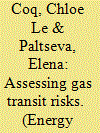

|
|
|
|
|
| Publication |
2012.
|
| Summary/Abstract |
This paper proposes a Transit Risk Index (TRI) designed to assess the riskiness of pipeline gas imports and to study the effect of introducing new gas routes. TRI controls for gas dependency, transit route diversification, political risks of transit, pipeline rupture probability, and the balance of power between supplying and consuming countries along the transit route. Evaluating TRI for the EU-Russia gas trade, we show that the introduction of the Nord Stream pipeline would further widen already large disparities in gas risk exposure across the EU Member States. The gas risk exposure of the Member States served by Nord Stream would decline. In contrast, EU countries not connected to Nord Stream, but sharing other Russian gas transit routes with the Nord Stream countries, would face greater gas risk exposure. We discuss the implications of our analysis for the design of the common energy policy in the EU.
|
|
|
|
|
|
|
|
|
|
|
|
|
|
|
|
| 2 |
ID:
143959
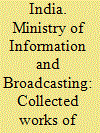

|
|
|
|
|
| Publication |
New Delhi, Publications Division, Ministry of Information and Broadcasting, 1992.
|
| Description |
xv, 583p.pbk
|
| Contents |
OLD Volume
|
|
|
|
|
|
|
|
|
|
|
|
Copies: C:1/I:0,R:1,Q:0
Circulation
| Accession# | Call# | Current Location | Status | Policy | Location |
| 058553 | 920.918148/IND 058553 | Main | On Shelf | Reference books | |
|
|
|
|
| 3 |
ID:
175245


|
|
|
|
|
| Summary/Abstract |
Home-heating energy-poverty risk presents both challenge and opportunity for policymakers, businesses and communities. Effective measurement and management of this risk requires an evidence base that accounts for characteristics of the householder, building, and heating system. A composite index utilising 10 indicators refined to Small Area level is created to deliver spatially refined analysis of home-heating energy-poverty risk. The index is used to assess home-heating energy-poverty risk across 18,641 Small Area clusters in Ireland. This risk index is a scalable and internationally transferrable methodology that can be extended to cover other energy uses. Importantly the index is also dynamic and offers the capacity to analyse changes in energy-poverty risk associated with specific policy intervention proposals, including major contemporary environmental policy transitions such as residential fabric retrofit, residential heating system changes, energy price changes and carbon taxation. The application of the index to the Irish case affords refined insight into the impact and incidence of various market, technology and policy driven interventions such as fuel price changes, retrofit strategies and carbon tax increases. Risk and impacts vary geographically, and this index is designed to inform targeted policy interventions to mitigate home heating energy-poverty risk and thereby support ambitions for a ‘just transition’.
|
|
|
|
|
|
|
|
|
|
|
|
|
|
|
|
| 4 |
ID:
185494
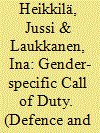

|
|
|
|
|
| Summary/Abstract |
We document that existing gender equality indices do not account for gender-specific mandatory peace-time conscription (compulsory military service). This suggests that gender-specific conscription is not considered to be an important gender issue. If an indicator measuring the gender equality of mandatory conscription was to be included in gender equality indices with appropriate weight, then the relative rankings of countries in terms of measured gender equality could be affected. In the context of the Nordic countries, this would mean that Finland and Denmark – the countries with mandatory conscription for men only – would have worse scores with respect to gender equality compared to Sweden and Norway, countries with conscription for both men and women – and Iceland, which has no mandatory conscription, regardless of gender.
|
|
|
|
|
|
|
|
|
|
|
|
|
|
|
|
| 5 |
ID:
140167
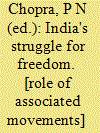

|
|
|
|
|
| Publication |
DelhI, Agam Prakashan, 1985.
|
| Description |
801-843p.hbk
|
| Contents |
Index and bibliography
per set Rs. 600.00
|
|
|
|
|
|
|
|
|
|
|
|
Copies: C:1/I:0,R:0,Q:0
Circulation
| Accession# | Call# | Current Location | Status | Policy | Location |
| 026664 | 954.03/CHO 026664 | Main | On Shelf | General | |
|
|
|
|
| 6 |
ID:
186004
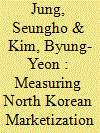

|
|
|
|
|
| Summary/Abstract |
Since the traditional central planning system virtually collapsed in the 1990s, growth of marketization has become the most prominent feature of the North Korean economy. In this article, we evaluate the development of de facto and de jure marketization of the 2000s in three dimensions of price liberalization, privatization, and financial system development. Accordingly, we construct a marketization index using the survey results of North Korean refugees and expert evaluations of the North Korean economy. The marketization level generally increased over the years despite the unfavorable foreign and domestic environments such as international sanctions and the anti-market polices of the mid-2000s. Among the three evaluation categories, price liberalization has advanced the most, whereas financial system development has developed the least. In particular, de facto privatization has rapidly expanded since Kim Jong Un came into power. However, from the economic reform perspective, the overall institutionalization level of the informal economy in North Korea still remains low compared to those of former socialist economies.
|
|
|
|
|
|
|
|
|
|
|
|
|
|
|
|
| 7 |
ID:
152795
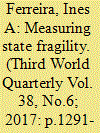

|
|
|
|
|
| Summary/Abstract |
State fragility has become a resonant term in the development discourse over the past decade. In its early days it served as a catch-all phrase used by donor organisations to draw attention to the need to assist ‘fragile states’. In response to the call for a better understanding of how to deal with these countries, there was a surge in measures of fragility. However, it was not long before academics pointed to the murkiness and fuzziness of the term, and identified several caveats to most of the proposals for quantification. This paper reviews existing approaches to operationalise this concept, distinguishing between those that offer no ranking or only partial rankings of fragile states, and those providing ordinal lists of countries. The examination of their theoretical underpinnings lends support to the critical view that most existing approaches are undermined by a lack of solid theoretical foundations, which leads to confusion between causes, symptoms and outcomes of state fragility.
|
|
|
|
|
|
|
|
|
|
|
|
|
|
|
|
| 8 |
ID:
187823
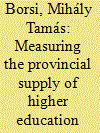

|
|
|
|
|
| Summary/Abstract |
This paper proposes and estimates three novel higher education indices for 31 Chinese provinces: i) the Chinese Higher Education Density Index (CHEDI) to analyze the evolution of the quantitative distribution of higher education institutions (HEIs) in each province from 2001 to 2017, which is further decomposed into subgroups based on the type of college, i.e., four-year undergraduate colleges, two-year vocational colleges, and private institutions; ii) the Chinese Higher Education Quality Index (CHEQI) to examine the supply of higher education in terms of quality using a university ranking system; and iii) the Chinese Higher Education Index (CHEI), a composite indicator that incorporates both the quantity and quality dimensions of higher education institutions for each province, providing a weighted measure of the supply of higher education in China. The empirical findings indicate a significant and persistent heterogeneity in the supply of higher education between provinces. The indices identify which regions have been substantially rewarded by the higher education expansion of recent decades, going from an undersupply to a proportionate supply of higher education institutions. On the other hand, a significant share of regions still has a low supply in terms of either the quantity or quality of HEIs, or both.
|
|
|
|
|
|
|
|
|
|
|
|
|
|
|
|
| 9 |
ID:
092615
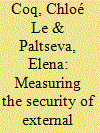

|
|
|
|
|
| Publication |
2009.
|
| Summary/Abstract |
The security of energy supply is one of the main objectives of EU energy policy. In this paper, we introduce an index designed to evaluate the short-term risks associated with the external supply of energy to the EU Member States. It combines measures of energy import diversification, political risks of the supplying country, risk associated with energy transit, and the economic impact of a supply disruption. We construct separate indexes for three primary energy types, oil, gas and coal, and demonstrate that Member States' levels of supply risk exposure differ across energies. Most other studies of this kind provide aggregate indexes combining different types of energy. Our results suggest that an aggregate approach could be misleading, at least for discussions of the short-term response to risks. We discuss the implications of our findings for the common energy policy.
|
|
|
|
|
|
|
|
|
|
|
|
|
|
|
|
| 10 |
ID:
176698
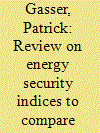

|
|
|
|
|
| Summary/Abstract |
The use of energy security indices has been increasing recently, as indicator-based approaches are particularly suitable to model multiple dimensions and compare countries. Moreover, indices represent effective communication tools for policymakers. This paper analyzes 63 indices quantifying the energy security performance of countries. In particular, their scope, geographical coverage, number of countries analyzed, time frame covered, number of indicators considered, data treatment approach, multivariate analysis, normalization, weighting and aggregation of the indicators, and the assessment of uncertainty, sensitivity and robustness are reviewed. Results show that there is a considerable lack of transparency, especially about the selection of the indicator set, normalization method, indicator weighting scheme and aggregation function. Furthermore, the index construction steps of data treatment and multivariate analysis are either not performed or under-reported. Finally, only few studies provide an uncertainty, sensitivity or robustness analysis, even though such an analysis has the potential to greatly improve the confidence into the results. Based on the findings of this paper, research gaps are identified and recommendations for future research provided. Even though the present analysis was conducted on energy security, the findings can be applied to indices in any field in order to support well-informed decision-making.
|
|
|
|
|
|
|
|
|
|
|
|
|
|
|
|
| 11 |
ID:
102082
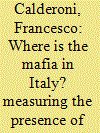

|
|
|
|
|
| Publication |
2011.
|
| Summary/Abstract |
This article presents the Mafia Index (MI), an index measuring the presence of mafias at the provincial level. In the abundant literature on Italian mafias, relatively few studies have attempted to measure the presence of mafias across the country. A review of previous attempts points out the limitations and methodological shortcomings of existing measurements. The study provides an operational definition of 'mafia' and selects the most appropriate indicators and variables according to multiple criteria. The MI combines data on mafia-type associations, mafia murders, city councils dissolved for infiltration by organised crime, and assets confiscated from organised crime and covers the period between 1983 and 2009. The MI highlights not only the strong concentration of the mafias in their original territories but also their significant presence in the central and northern provinces. This confirms that mafias should not be regarded as typically Southern Italian phenomena, but rather as a national problem.
|
|
|
|
|
|
|
|
|
|
|
|
|
|
|
|
|
|
|
|
|